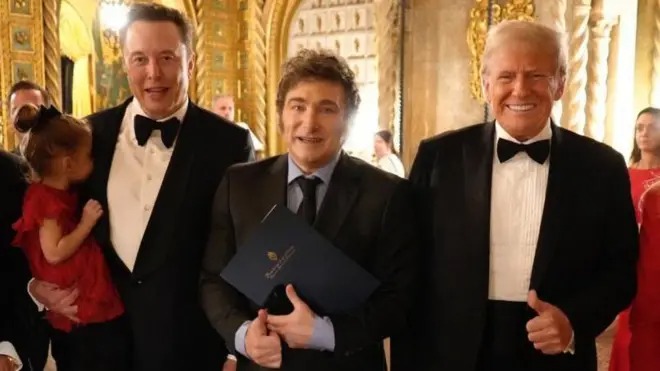Before Javier Milei became president, Argentina gave some government workers a guarantee that, upon death, their children got their jobs. Vegetable stands received a bonus if they sold what the government considered “normal” potatoes. And diners were strongly discouraged from putting tips on their credit cards, causing them to leave wads of inflation-hit cash for a gratuity.
Those regulations and hundreds of others are now gone. A year into his term, the self-described anarcho-capitalist who rules Argentina has taken a chain saw to the red tape and unchecked public spending he inherited from a Peronist administration that left the economy in ruins.
Milei’s accomplishments have turned him into a star among an ascendant global right—from President Trump to Italian Prime Minister Giorgia Meloni. Known here as “El Loco”—the Madman—Milei has become especially close with Elon Musk during a more than yearlong bromance as the two men laud each other’s achievements and attack progressive ideals.
Argentina has so far cut more than 900 regulations, Milei said Monday after attending Trump’s inauguration. At a black-tie gala, rapturous crowds chanted his name and conservatives took selfies with the wild-haired leader with Wolverine-like sideburns. He said his government stands ready to provide advice to Trump and Musk on cutting red tape in the U.S.
In Argentina, Milei slashed real public spending by 30% and fired 36,000 public workers. He shut down the Ministry of Women, Genders and Diversity, halted most public works, sharply curbed pensions and sliced subsidies that, among other things, provided Argentines with nearly free electricity.
“This is a fight against the status quo,” said Federico Sturzenegger, a 58-year-old former Harvard University economist Milei tapped as his deregulation czar.
The cost-cutting resulted in a rare fiscal surplus and brought down inflation from 26% a month in December 2023 when Milei took office to 2.7% a month a year later. The economy is expected to grow 5% this year after contracting 2.8% in 2024, according to the International Monetary Fund.
With millions of Argentines reeling under his cutbacks and austerity, Milei is now under pressure to get people back to work. His aides believe the solution lies in making it easier for companies to invest in a nation the Heritage Foundation think tank last year ranked 145th in terms of economic freedom, just ahead of Pakistan.
“Argentina is full of restrictions and red tape, so removing those things is critical to getting the economy going,” said Martin Castellano, chief Latin America economist at the Institute of International Finance, a banking-industry research group. “It’s as critical as stabilizing the macroeconomic conditions.”
Few countries have built up such a vast welfare and regulatory state in the past century as Argentina, where a succession of populist leaders expanded taxes and bureaucracy while intervening heavily in the economy.
The expansion of economic controls took off as Argentina grappled with the Great Depression and a 1930 military coup. The country’s leaders sought to create self-sufficient industries in response to a collapse in farm exports, ramping up the state’s control over the economy and implementing a slew of regulations to protect Argentine industries from foreign competition, said historian Daniel Balmaceda.
The process accelerated after World War II under Juan Perón, who nationalized utilities, railways and grain elevators and expanded welfare services while fueling a more powerful labor movement beholden to him. Milei’s immediate predecessors, Alberto Fernández, and before him, Cristina Kirchner, ramped up money printing to fund state companies while deploying inspectors so supermarkets complied with price controls.
Even as a once-rich economy became persistently volatile, more red tape resulted—as well as decades of economic dysfunction marked by inefficient companies, government overspending that fueled high inflation, and corruption.
Milei, a 54-year-old libertarian economist, assailed that system for creating what he called a “political caste” that hurt ordinary Argentines. Milei, who has named his cloned dogs after free-market economists, waved around a chain saw at campaign rallies to symbolize his plans to cut back the state and restore prosperity to a nation whose Parisian-like architecture is a reminder of better times.
“There’s nothing on earth that can put a brake on the strength of the heaven of the chain saw,” Milei told The Wall Street Journal in an interview last month at the presidential palace. “We need to continue with the deregulation agenda.”
The man in charge of revving up the chain saw is Sturzenegger, a strapping former central bank chief who Milei refers to as “colossus.” Sturzenegger, an MIT-educated economist who wrote his thesis under Paul Krugman and Rudiger Dornbusch, describes himself as “the plumber of freedom.”
A leading Argentine economist, he has spent his career moving between academia and posts in center-right governments in Argentina, including as chief economist of the state oil company and president of the central bank. He has written textbooks on macroeconomics and conducted detailed research into exchange-rate regimes while consulting for countries from South Africa to Afghanistan.
It was at Harvard during his spare time from teaching classes that Sturzenegger began reviewing Argentina’s statute book and its tangled regulations. He spent weekends compiling a list of the thousands of Byzantine laws, decrees, and codes that economists say suffocated business, drove wasteful spending or didn’t make much sense.
He recalled doubting his work would ever be implemented, believing it might instead be published in a book one day.
“I’m very curious and, honestly, I had a lot of fun,” he said in an interview at his office. “But you have to have the willingness to dive in and look…and read law by law, article by article. There are laws that have like 500 articles.”
Sturzenegger said he was motivated by the idea of creating an Argentina where young people could find good jobs, instead of leaving for work abroad. “I want to grow old with my children here,” he said.
Sturzenegger asked different industry experts to suggest changes in the statute book. He highlighted problematic regulations by pointing to products that were significantly more expensive here than abroad, blaming the price gap on red tape.
“If you see medication that costs eight times more here than in the rest of the world, you know there’s a problem,” he said. “The devil is in the details.”Argentina’s consumer-price index, change from a month earlierSource: Capital Economics
The red tape included rules that required the milk industry to set prices with the government, limits on selling what are usually over-the-counter medicine in other countries, and taxes on purchases Argentines made abroad. One obscure regulation required representatives of local industries to supervise imports of products similar to what they produce domestically, said Sturzenegger.
He carried out his research initially for the presidential campaign of Patricia Bullrich, a conservative who is now Milei’s security minister. When she lost the election, Sturzenegger took his findings to Milei, then the president-elect.
“He was surprised and said, ‘We have to do all of this,’” Sturzenegger said, referring to Milei’s reaction to the huge body of work he’d compiled.
The president put Sturzenegger in charge of a newly created Ministry of Deregulation and State Transformation. Sturzenegger gave out his personal email so Argentines could send him recommendations. He’d often get about 200 messages a day, Sturzenegger said. The ministry now has a website to receive tips from the public.
The government has so far done everything from making it easier to get a divorce to opening up competition in the airline industry. It has abolished price controls on food, rent controls on apartments and strict packaging requirements for watermelons.
Sturzenegger estimates that real costs have declined about 30% on average in sectors where regulations have been cut back.
“There are thousands of ridiculous regulations,” he said. “For me, the trap of the Argentine system is in its laws.”
The government also reduced the number of ministries from 18 to nine. It shuttered a museum dedicated to the history of men’s suits, a government regulator overseeing travel agencies and a state agency that supervised water projects, which Sturzenegger said was rife with nepotism.
“We are going to have a much more efficient and much less costly state,” said Sturzenegger “That is going to imply fewer taxes, and salaries are going to be able to buy more goods. People are going to see a direct improvement in their quality of life.”
Pedro Cascales, a businessman in Buenos Aires, once tried to import tires but found the government requirements for bringing in automotive parts from abroad so burdensome that he gave up. Sturzenegger got rid of the rules for certifying foreign-made automotive parts last year.
“It was a real nightmare,” said Cascales. “Now it is going to be much simpler. That will generate more competition and lower prices for imported tires.”
Milei is betting on a V-like economic rebound, writing in a recent column in newspaper La Nacion that “2025 will be the beginning of the reconstruction of Argentina.”
And there are signs the economy is bouncing back as real wages recover and poverty eases after a sharp rise when Milei devalued the peso after taking office and cut subsidies. Companies have committed to investing billions of dollars in Argentina, which is rich in lithium and natural gas, under a new investment-promotion regime that provides tax and currency benefits over 30 years.
Serious challenges remain. Nearly half the population remains poor, with an income of less than $260 a month in greater Buenos Aires, up from around 44% when Milei took office, according to Argentina’s Catholic University. Polls show unemployment and poverty overtaking inflation as the top concern.
“Argentines have shown remarkable patience, but eventually that will run out if they don’t see employment improve,” said Benjamin Gedan, director of the Latin America program at the Wilson Center, a Washington-based think tank. “There’s a lot that could still go wrong.”
Fabiana Díaz, a 39-year-old single mother of two, hopes there will soon be more work after economists say some 290,000 jobs were lost in the first nine months of Milei’s term.
Having lost her job as a seamstress at a private factory, she now does odd jobs in her poor Buenos Aires barrio, fixing shoes and old pairs of pants for neighbors who can’t afford new clothes. She stopped buying fruit for her family. For the first time, Díaz says she couldn’t afford a birthday party for her 14-year-old son.
“Impossible, I have nothing,” she said. “Every day when I wake up, I pray for a change.”
To boost the economy, businesses are advocating an end to export taxes, which would make Argentine firms more competitive abroad.
“There are positive changes, but there is still more to be done,” said Marcelo Figueiras, president of Argentine pharmaceutical company Laboratorios Richmond. “The playing field is not level.”
Milei has agreed to reduce the taxes. He has also pledged to end currency and capital controls, which economists say stifle investments.
“Nobody wants to put their money in if they can’t get it out,” said Cascales, the businessman. “You really need the controls to be lifted.”
Lifting the controls is delicate given the nation’s depleted central bank reserves and the population’s lack of confidence in Argentina’s currency after decades of economic mismanagement. Getting rid of the controls could spark a run on the peso and drive inflation back up, undercutting Milei’s strong popular support, which some polls have around 55%.
But economists say keeping the controls in place creates another problem: an overvalued peso that hurts growth.
The peso was one of the world’s strongest-performing currencies against the dollar last year. That makes it harder for the central bank to build up reserves as exports become less competitive and as the bank sells dollars to defend the peso. The dearth of foreign reserves, meanwhile, has so far defeated one of Milei’s main campaign promises, to get rid of the peso altogether and dollarize the economy.
The strong peso has also hurt economic growth that Argentina badly needs to create jobs and boost government tax revenue so authorities can balance the budget without more austerity, economists say.
“There is only so long you can cut public spending. At some point you want the economy to grow again,” said Kimberley Sperrfechter, an economist who closely tracks Argentina at consulting firm Capital Economics. “And in order for Argentina to grow on a more sustainable basis, you need a weaker exchange rate.”
Milei contends that the peso is not overvalued, attributing its strength to greater confidence in Argentina under his rule. To lift the controls, he said, his government needs a new IMF loan, which he said he hopes the Trump administration will make possible.
IMF managing director Kristalina Georgieva said Sunday that the fund is working toward a new loan to support Argentina’s economy, lauding what she called a “remarkable transformation” under Milei.
Sturzenegger says all of these moves are crucial to rebuild the foundations for Argentina’s growth.
“We’re in the beginning of the process of reforming the state,” he said. “The final objective is for Argentina to be one of the freest economies in the world.”
Read more: https://www.wsj.com/world/americas/javier-milei-maga-hero-argentina-b9b0e7ce?st=teeL5z





